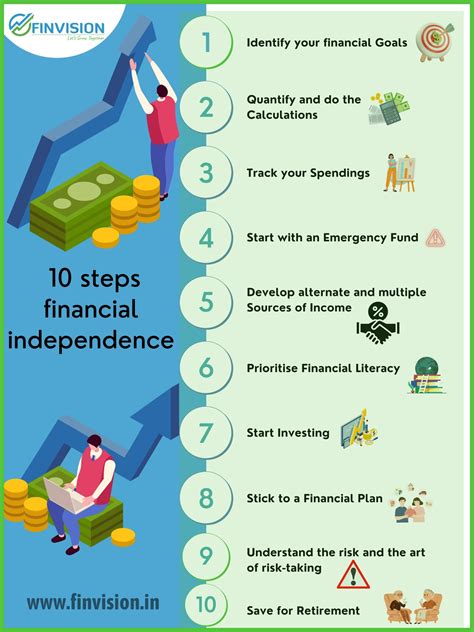Achieving independence is a multifaceted process that encompasses financial, emotional, and psychological aspects. It’s a journey that requires dedication, resilience, and a clear understanding of one’s goals and values. Here, we’ll delve into the concept of independence, exploring its various dimensions and providing actionable steps towards attaining it.
Understanding Independence
Independence is not just about being self-sufficient financially; it’s also about emotional and psychological autonomy. It means being able to make decisions based on your own beliefs and values, without external influence. This form of independence empowers individuals to pursue their passions, build meaningful relationships, and live a life that truly reflects their authentic selves.
Financial Independence
Financial independence is a critical component of overall independence. It allows individuals to pursue their goals and interests without being constrained by financial worries. Here are some steps towards achieving financial independence:
Budgeting and Tracking Expenses: Understanding where your money is going is the first step towards managing your finances effectively. Create a budget that accounts for all your expenses, and regularly track your spending to identify areas for improvement.
Investing Wisely: Investing is a powerful way to grow your wealth over time. Whether it’s through stocks, real estate, or other investment vehicles, it’s crucial to educate yourself and make informed decisions that align with your financial goals.
Building an Emergency Fund: Life is unpredictable, and financial setbacks can happen to anyone. Having an emergency fund in place can provide peace of mind and prevent debt accumulation during difficult times.
Paying Off Debt: High-interest debt can be a significant obstacle to financial independence. Developing a debt repayment plan and sticking to it can help you overcome this hurdle and free up more money in your budget for savings and investments.
Emotional and Psychological Independence
Achieving emotional and psychological independence involves developing self-awareness, setting healthy boundaries, and cultivating a sense of self-worth that isn’t dependent on external validation. Here are some steps to consider:
Self-Reflection and Awareness: Understanding your thoughts, feelings, and behaviors is key to emotional independence. Engaging in self-reflection activities such as journaling, meditation, or therapy can help you gain insights into your emotional landscape.
Setting Boundaries: Healthy boundaries are essential for maintaining emotional well-being and independence. Learning to say “no” when necessary and setting clear expectations with others can protect your time, energy, and emotional space.
Cultivating Self-Worth: Your sense of self-worth should be rooted in your values, accomplishments, and personal growth, rather than in external validation. Fostering self-compassion, acknowledging your strengths, and celebrating your achievements can help build a resilient sense of self-worth.
Embracing Lifelong Learning: Independence is also about being open to new experiences and knowledge. Embracing lifelong learning can empower you to navigate different situations effectively and make informed decisions about your life.
Practical Steps to Independence
Beyond the financial and emotional aspects, achieving independence often requires making practical changes in your daily life. Here are some actionable steps:
Developing Essential Skills: Acquiring skills that contribute to self-sufficiency, such as cooking, basic car maintenance, or DIY home repairs, can significantly boost your independence.
Creating a Support Network: While independence is about autonomy, it doesn’t mean going it alone. Building a network of supportive relationships with friends, family, or a community can provide a safety net and emotional support when needed.
Setting Goals and Planning: Having clear goals and a plan to achieve them is vital for independence. Whether it’s related to your career, education, or personal development, setting specific, measurable objectives can guide your decisions and actions.
Embracing Challenges: Independence often involves stepping out of your comfort zone and facing challenges head-on. Viewing obstacles as opportunities for growth and learning can help you build resilience and confidence.
Conclusion
Achieving independence is a journey that requires patience, dedication, and a willingness to learn and grow. By focusing on financial stability, emotional autonomy, and practical self-sufficiency, individuals can pave their way to a more independent life. Remember, independence is not an endpoint but a continuous process of self-improvement and empowerment.
What are the key components of achieving independence?
+Achieving independence involves financial independence, emotional and psychological autonomy, and practical self-sufficiency. It’s about making informed decisions, being financially stable, emotionally resilient, and capable of navigating life’s challenges independently.
How can someone start working towards financial independence?
+Starting with budgeting and tracking expenses, followed by debt repayment, investing wisely, and building an emergency fund are foundational steps towards financial independence. Educating oneself about personal finance and seeking professional advice when needed can also be beneficial.
What role does self-awareness play in achieving emotional independence?
+Self-awareness is crucial for emotional independence as it allows individuals to understand their emotions, thoughts, and behaviors. Through self-reflection, individuals can identify patterns that may hinder their emotional autonomy and work towards developing healthier emotional habits and boundaries.



